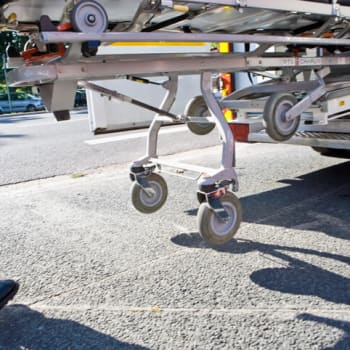Life Alert Review
In this article...
- A Life Alert system lets you access help in a medical emergency. This detailed Life Alert review can help you decide if it's the right system for you.
Since 1987, Life Alert medical alert systems have helped seniors access emergency assistance at home and out and about. In fact, a 2004 study found that 87% of Life Alert customers feel their system gives them the confidence and security to live at home instead of entering a residential setting.
Investing in a Life Alert system can provide great peace of mind, and its literature claims it has a 200% higher emergency staff member to customer ratio than many of its competitors. However, Life Alert isn't the only medical alert system out there, and you may be able to find a cheaper alternative through other companies. This in-depth Life Alert review explains everything you need to know about these systems, including pricing, features and add-on devices.
Join our email series to receive your free Medicare guide and the latest information about Medicare. Your free Medicare guide is on the way. Make sure to check your spam folder if you don't see it. The email delivery service is currently unavailable. We are working to resolve this issue as soon as possible.
Learn More About Medicare
Thanks for signing up!
We are sorry!
Life Alert Basics
Life Alert is a medical alert system that allows you to call for help if you experience a fall or medical emergency. All Life Alert systems come with a master unit and a help button that you wear around your neck or wrist. You'll also receive a waterproof help button to place in your shower or bath.
When you press the button, it connects you to the company-owned emergency response center, and you can expect an operator to answer within 20 seconds. The operator will then communicate with you and alert the appropriate emergency services to come and assist.
Life Alert also sells a Mobile + GPS add-on that you can wear away from home. This tiny device works similarly to the regular help button, allowing you to connect and communicate with an emergency operator. The device includes a GPS tracker that lets the emergency services access your location, so you can still get help if you're lost or confused.
Although Life Alert systems are better known for handling medical emergencies, you can also use them to contact the police, fire or roadside assistance services. This feature allows you to get help fast in a wide range of situations, such as hearing an intruder inside your home. The emergency center can also notify a nominated caregiver.
How Much Does Life Alert Cost?
Life Alert sells its medical alert systems as bundles. The most affordable option is purchasing the master unit and help button, which costs $69.99 per month. Adding the Mobile + GPS device increases the monthly price to $89.99. You'll pay a prorated charge if you start your contract partway through a month.
Life Alert also charges a one-off fee to purchase and install your master unit. It costs $198 to set up your equipment, and the company doesn't offer free trials or satisfaction guarantees. Customers must also commit to a 3-year contract when signing up for Life Alert, although the company permits contract terminations if you die or move into an assisted living community.
It's worth bearing in mind that Life Alert is one of the pricier medical alert systems on the market. For example, Bay Alarm Medical offers monthly contracts starting from $19.95, while OneCallAlert provides similar services for around $24.95 a month.
Advantages of Life Alert Systems
Although the price of a Life Alert system might seem steep, the high cost makes more sense when you take a closer look at its features.
Long Battery Life
A primary advantage of Life Alert devices is that they contain high-quality pacemaker batteries that can last for up to 10 years. Many of its competitors have batteries that require charging every few days, giving Life Alert a significant edge. This feature could make it a good option for people who are likely to forget to charge their devices and want the reassurance of knowing they won't run out of power.
Two-Way Communication
Another key benefit is that Life Alert help buttons enable two-way communication, allowing you to explain the situation to the call handler to get the most appropriate help. Many cheaper alternatives don't have this capability.
Decent In-Home Range
Life Alert systems also offer a significantly wider in-home range than many of its competitors. You can activate the help button up to 800 feet from the master unit, making it a good option for larger homes or if you want to wear your device in the garden. However, there are systems available with even broader connectivity. For example, OneCallAlert systems have an in-home range of up to 1,400 feet.
Broad Mobile Coverage
Many medical alert system providers have contracts with a single mobile carrier. This can lower the cost for consumers, but the downside is that you can't use your button in areas with weak network coverage. Life Alert works with multiple carriers, significantly improving the coverage areas for its users. Therefore, you can leave home feeling reassured that your Mobile + GPS button will work pretty much anywhere.
Added Features
The above benefits describe the key areas where Life Alert stands out from the competition. However, these systems come with several other features that could make them a good choice, although availability depends on your plan. These include:
- Round-the-clock monitoring
- American-based emergency center
- Caregiver alerts
- 72-hour backup battery
- Lifetime battery and device warranty
Disadvantages of Life Alert Systems
One of the key disadvantages of a Life Alert system is the high costs involved, which may be unaffordable for many older adults. The lack of a trial period and relatively long contract length could also be off-putting for people who want to try a system out before making a long-term commitment.
Life Alert offers all the basic essentials, such as two-way communication. While it's one of the best products available if you want a straightforward system, it doesn't offer as many add-ons as some newer companies. One feature missing from Life Alert systems is fall detection. Fall detection pendants automatically call for help if they notice a sudden descent or impact, and they're included as standard on many modern systems.
Another potential drawback of Life Alert systems and devices is that they lack integrated internet connectivity. This won't be an issue for some older adults if they don't have smart systems in their homes. However, some people may prefer the extra convenience of Wi-Fi connectivity.
Is a Life Alert System Right for Me?
A Life Alert system could be a good option for you if you want an easy-to-use system that connects to your home landline. It could also be a suitable choice for older adults who wander because the above-average network coverage means that the emergency center can locate them anywhere.
However, the price will probably be the determining factor for many people considering a Life Alert system. If you prefer to use a company with an established reputation, you may feel that Life Alert is worth the cost. However, it's a good idea to compare the price and features of several medical alert systems before committing to a 3-year Life Alert package.





